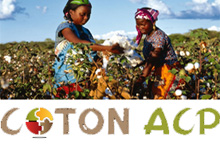“African cotton at a crossroads”: Marking 10 years of the EU-Africa Partnership on Cotton in Cotonou, Benin
 Brussels, 3 March 2015/ ACP: The EU-Africa Partnership on cotton was established in July 2004 at a time when the price of cotton had been following a historic downward trend since 2000. The programme is funded by the European Development Fund under the ACP-EU partnership framework.
Brussels, 3 March 2015/ ACP: The EU-Africa Partnership on cotton was established in July 2004 at a time when the price of cotton had been following a historic downward trend since 2000. The programme is funded by the European Development Fund under the ACP-EU partnership framework.This Partnership takes into account the either major or significant socio-economic role played by the cotton sectors in many African cotton-producing countries and the many challenges that the African cotton sector must tackle, which have been included in the Action Framework of the Partnership.
As a long term objective, the Partnership aims to contribute to fighting poverty in African cottonproducing areas by increasing the competitiveness, added value and sustainability of African cotton sectors and consequently optimise their impact on producers’ incomes.
Throughout the 10 years of the Partnership, close to 200 actions in support of African cotton sectors have been taken in around 20 countries. These add up to a total funding estimated at nearly 570 million euros, most of which was in the form of grants. The European Union alone, through the European Commission and its Member States, represents nearly 70% of the total funding.
Looking back at the avenues taken, pausing to analyse outcomes and failings and taking stock are necessary steps to producing reliable decisions and to making informed choices for the future of African cotton. What is the assessment of these 10 years of the Partnership? What are the effects, impacts and results of the support provided to the African cotton sector since
2004? What kinds of expertise, developed by various organisations, should be enhanced, shared and adapted by the actors of the cotton ecosystem? What are the new challenges that the African cotton sector must primarily face?
In an attempt to provide relevant answers to these questions, a three-day meeting will be hosted in Cotonou, Benin, from 9 to 11 March 2015.
On 9 March 2015 the third Steering committee of the Programme will be held during the first part of day. The progress report regarding the implementation of the programme, as well as the prospects for the upcoming months, will be presented and discussed.
The second part of the day will be devoted to a working session on the Pan African Cotton Road Map.
On 10 March 2015 technical workshops will be held during the first part of the day on the
following topics:
1. Sustainability, innovations and index-based insurance: challenges for African cotton farms
2. A new regional approach for promoting and improving the quality of African cotton
3. Developing the cotton-textile sector in Africa: opportunities and challenges
These workshops will bring together members of the Commission, ACP Secretariat, experts of the African working group on cotton, representatives of the C4, AProCA, A.C.A, MOZAZIMA, ACTIF, the representatives of the UEMOA, ECCAS, COMESA, regional focal points, national representatives of producers and ginners, representatives of cotton research, investors, development agencies and international organizations.
The recommendations for each topic, summarised by the rapporteurs, will be communicated to the President of COS-cotton.
The second part of the day will be dedicated to a working session with the regional focal points of the Cotton Programme in order to identify channels and means of improving communication and sharing of information between the national and regional level of the cotton strategies.
On 11 March 2015 the twentieth meeting of COS-cotton will be held and will provide the
opportunity to celebrate the 10th anniversary of the EU-Africa Partnership on cotton during an official evening ceremony.
This same day, “expertise stands” will provide examples of results achieved thanks to the expertise developed by various organisations working long-term in support of the African cotton sector.
For more information, please contact Mr. Yao Adingra, Expert – Commodities and Protocol, +32 2 7430691, adingra@acp.int or visit www.coton-acp.org
